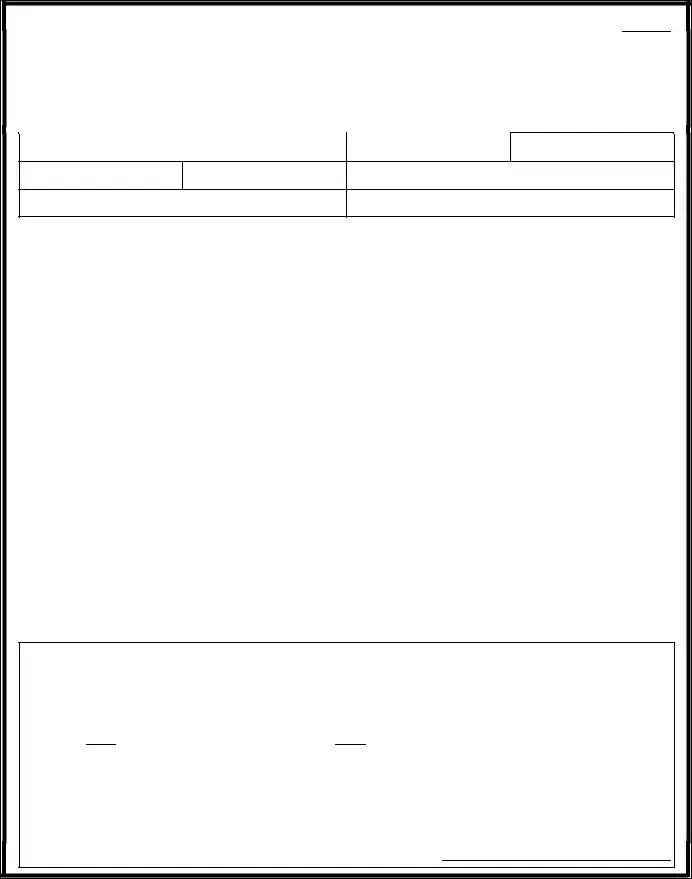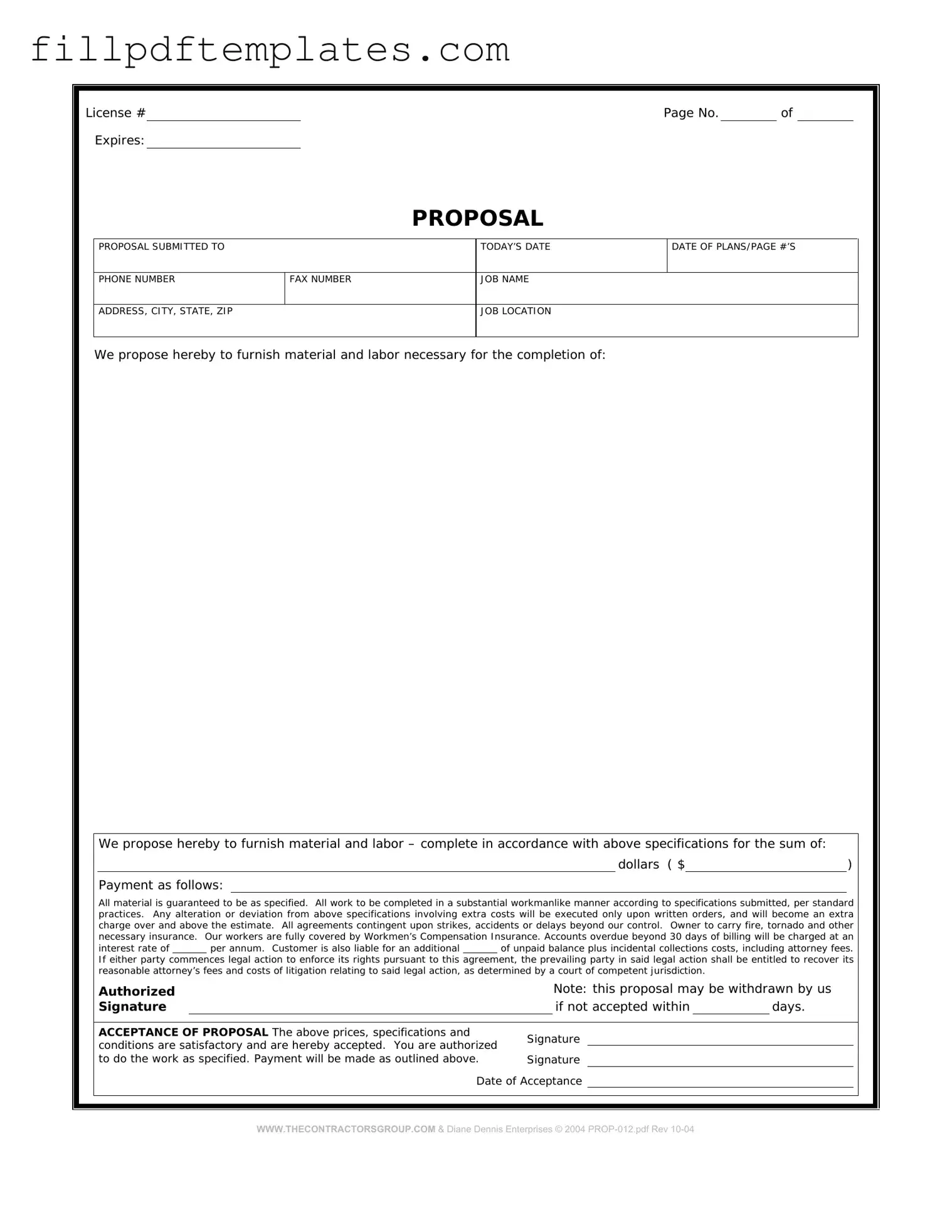Fill a Valid Construction proposal form Template
The Construction Proposal Form serves as a critical document in the building and construction industry, facilitating communication between contractors and clients. This form typically outlines the scope of work, detailing the specific tasks to be performed and the materials required. It includes essential information such as project timelines, estimated costs, and payment terms, ensuring that both parties have a clear understanding of expectations. Additionally, the form may incorporate clauses related to compliance with local regulations and safety standards, which are vital for maintaining legal and operational integrity throughout the project. By standardizing the proposal process, this form not only enhances transparency but also helps to mitigate potential disputes that may arise during the construction phase. Overall, the Construction Proposal Form is an indispensable tool that lays the groundwork for successful project execution and fosters a collaborative relationship between contractors and clients.
Additional PDF Templates
Does a 1098 Help With Taxes - This form serves as an important financial document that helps you manage your mortgage file.
In Ohio, utilizing a Hold Harmless Agreement can significantly reduce the legal risks associated with various activities by ensuring that parties involved understand their responsibilities and liabilities. This agreement serves as a crucial tool for protecting individuals and organizations from potential claims by transferring the burden of risk, thus fostering a safer environment for all participants involved.
Amazing Goodwill Donation Receipt - Your donation receipt can assist in reporting charitable contributions.
Similar forms
The Construction proposal form serves as a vital document in the construction industry, outlining the details of a project and the proposed costs. Several other documents share similarities with this form, each serving a specific purpose in the construction and contracting process. Here are nine documents that are comparable to the Construction proposal form:
- Bid Proposal Form: Like the Construction proposal form, a bid proposal outlines the costs and scope of work for a project. It is typically submitted in response to a request for proposals (RFP) and includes details on materials, labor, and timelines.
- Contractor Agreement: This document formalizes the relationship between the contractor and the client. It includes terms and conditions similar to those found in a Construction proposal form, such as payment schedules and project deliverables.
- Scope of Work Document: This document defines the specific tasks and responsibilities involved in a project. It complements the Construction proposal form by providing a detailed description of what is included in the proposal.
- Change Order Form: When modifications to the original project scope arise, a change order form is used. It details adjustments in costs and timelines, similar to how a Construction proposal form outlines initial project expectations.
- Motor Vehicle Bill of Sale: This document serves as proof of purchase when selling a vehicle in Illinois, ensuring a legal transfer of ownership. For more information about the importance and details of the document, read more about the form.
- Estimate Worksheet: An estimate worksheet provides a breakdown of costs for materials and labor. It is similar to the Construction proposal form in that both documents aim to give clients a clear understanding of financial expectations.
- Subcontractor Agreement: This document establishes the terms between a contractor and a subcontractor. It often mirrors the Construction proposal form by detailing the scope of work and payment terms for specific tasks.
- Project Timeline: A project timeline outlines the schedule for completing various phases of a construction project. It is related to the Construction proposal form, which often includes estimated completion dates and milestones.
- Invoice: After work is completed, an invoice is issued to request payment. Like the Construction proposal form, it details costs and services rendered, though it reflects completed work rather than proposed work.
- Request for Information (RFI): An RFI is used to clarify project details and specifications. It often arises from ambiguities in the Construction proposal form, ensuring that all parties are on the same page regarding project requirements.
Document Specifics
| Fact Name | Description |
|---|---|
| Purpose | The construction proposal form serves as a formal document to outline project details, costs, and timelines for potential clients. |
| Components | Typically includes sections for project scope, materials, labor costs, and payment terms. |
| State-Specific Forms | Some states require specific formats or additional disclosures. For example, California mandates compliance with the California Business and Professions Code. |
| Submission Process | Clients usually receive the completed proposal form via email or in person, allowing for review and negotiation. |
| Legal Implications | Once signed, the proposal can serve as a binding contract, subject to state contract laws and regulations. |
Things You Should Know About This Form
-
What is a Construction Proposal Form?
A Construction Proposal Form is a document used by contractors to outline the details of a construction project. It includes information about the scope of work, materials to be used, timelines, and cost estimates. This form serves as a formal proposal to clients and helps in establishing clear expectations for both parties.
-
Who should use a Construction Proposal Form?
This form is primarily used by contractors, builders, and construction companies. However, clients seeking to understand the details of a proposed project may also benefit from reviewing the form. It is a useful tool for anyone involved in the construction process.
-
What information is typically included in the form?
The Construction Proposal Form generally includes:
- Project description
- Scope of work
- Materials and equipment to be used
- Timeline for completion
- Cost estimates, including labor and materials
- Payment terms
- Any necessary permits or licenses
-
How do I fill out a Construction Proposal Form?
To complete the form, start by providing your contact information and that of the client. Next, describe the project in detail, including the scope of work and materials. Be sure to include a timeline and a breakdown of costs. Review the form for accuracy before submitting it to the client.
-
Is there a standard format for the Construction Proposal Form?
While there is no universally mandated format, many contractors use templates that cover the essential elements of a proposal. It is important to ensure that the form is clear, organized, and easy to understand. Customizing the form to fit the specific project can also be beneficial.
-
Can I modify the Construction Proposal Form?
Yes, modifications can be made to the form to better suit the needs of a particular project. Adjustments may include adding sections for additional details or altering the layout for clarity. It is important that all changes maintain the form's purpose of providing a clear proposal.
-
What happens after I submit the Construction Proposal Form?
After submission, the client will review the proposal. They may accept it as is, request modifications, or negotiate terms. Once both parties agree on the proposal, a contract may be drafted based on the agreed-upon terms.
-
Is a Construction Proposal Form legally binding?
A Construction Proposal Form is generally not legally binding on its own. However, if both parties agree to the terms outlined in the proposal and sign a contract based on it, that contract may be legally enforceable. It is advisable to consult with a legal professional for specific guidance.
-
How can I ensure my proposal is competitive?
To create a competitive proposal, research the market rates for similar projects. Provide detailed and transparent cost estimates, and highlight your qualifications and experience. Clear communication and a professional presentation can also enhance the appeal of your proposal.
-
What should I do if my proposal is rejected?
If your proposal is rejected, seek feedback from the client to understand their concerns. This information can be invaluable for future proposals. Consider revising your proposal based on the feedback received and resubmitting it if appropriate.
Documents used along the form
When engaging in construction projects, several documents accompany the construction proposal form. Each of these documents plays a vital role in ensuring clarity and agreement between parties. Below is a list of commonly used forms and documents that are essential in the construction process.
- Contract Agreement: This document outlines the terms and conditions agreed upon by both the contractor and the client. It serves as the legal basis for the project.
- Scope of Work: This document details the specific tasks and responsibilities involved in the project. It helps to set clear expectations for all parties.
- Change Order: When modifications to the original plan are necessary, a change order is used. It documents any changes in scope, cost, or timeline.
- RV Bill of Sale: The https://arizonaformpdf.com/ is essential for documenting the sale and transfer of ownership for recreational vehicles in Arizona, ensuring a clear understanding between buyer and seller.
- Project Schedule: This timeline outlines key milestones and deadlines for the project. It helps keep the project on track and ensures timely completion.
- Bid Proposal: Often submitted by contractors, this document presents the estimated costs and terms for completing the project. It helps clients compare different bids.
- Insurance Certificates: These documents provide proof of insurance coverage for the contractor. They protect both parties from potential liabilities.
- Permits and Licenses: Necessary permits and licenses must be obtained before construction begins. They ensure that the project complies with local regulations.
- Payment Schedule: This document outlines when and how payments will be made throughout the project. It helps manage cash flow and ensures transparency.
Understanding these documents is crucial for anyone involved in construction. They help facilitate communication and ensure that all parties are on the same page throughout the project. Proper documentation can prevent disputes and foster a smoother construction experience.
Construction proposal form Preview

License # |
|
Page No. |
|
of |
Expires: |
|
|
|
|
PROPOSAL
PROPOSAL SUBMITTED TO |
TODAY’S DATE |
DATE OF PLANS/PAGE #’S
PHONE NUMBER
FAX NUMBER
JOB NAME
ADDRESS, CITY, STATE, ZIP
JOB LOCATION
We propose hereby to furnish material and labor necessary for the completion of:
We propose hereby to furnish material and labor – complete in accordance with above specifications for the sum of: |
|
|||
|
|
dollars ( $ |
|
) |
Payment as follows: |
|
|
||
All material is guaranteed to be as specified. All work to be completed in a substantial workmanlike manner according to specifications submitted, per standard practices. Any alteration or deviation from above specifications involving extra costs will be executed only upon written orders, and will become an extra charge over and above the estimate. All agreements contingent upon strikes, accidents or delays beyond our control. Owner to carry fire, tornado and other necessary insurance. Our workers are fully covered by Workmen’s Compensation Insurance. Accounts overdue beyond 30 days of billing will be charged at an
interest rate of per annum. Customer is also liable for an additional of unpaid balance plus incidental collections costs, including attorney fees. If either party commences legal action to enforce its rights pursuant to this agreement, the prevailing party in said legal action shall be entitled to recover its reasonable attorney’s fees and costs of litigation relating to said legal action, as determined by a court of competent jurisdiction.
Authorized |
|
Note: this proposal may be withdrawn by us |
|||||
Signature |
|
|
if not accepted within |
|
days. |
||
|
|
|
|
|
|
|
|
ACCEPTANCE OF PROPOSAL The above prices, specifications and |
Signature |
|
|
|
|||
conditions are satisfactory and are hereby accepted. You are authorized |
|
|
|
||||
|
|
|
|
|
|
||
to do the work as specified. Payment will be made as outlined above. |
Signature |
|
|
|
|
||
Date of Acceptance
WWW.THECONTRACTORSGROUP.COM & Diane Dennis Enterprises © 2004
